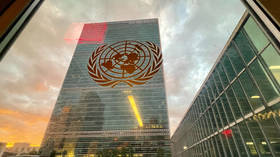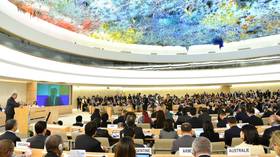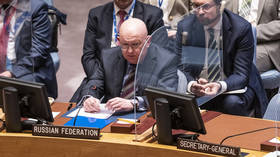Russia responds to Human Rights council expulsion threat

The possible suspension of Russia from the UN Human Rights Council threatens to destroy “the basement of current multilateral system,” First Deputy Permanent Representative to the UN Dmitry Polyanskiy said ahead of Thursday’s vote by the organisation's General Assembly (UNGA) on the matter.
Polyanskiy wrote on Telegram that this is a “premeditated tactical move” which, in his opinion, has nothing to do either Russia’s attack on Ukraine nor with alleged human rights violations by Moscow, as these claims “are far from being verified and proven.” However, he warned, the motion, if accepted, “risks devastating consequences for the UN System.”
“Russia plays an important ballancing role, its removal from HRC will deprive developing countries of a vocal and powerful defender. That’s why Western countries are keen to do it and strike the ballance [sic] in their favor,” the official explained.
In Polyanskiy’s words, the West is trying “to undermine UN institutions behind the smokescreen of punishing Russia.” “By doing so they risk to destroy the basement of current multilateral system which emerged after WW2 and has been saving the world from WW3,” he underlined.
He also pointed out to the fact that in 2018, during Donald Trump’s presidency, the US withdrew from the council and “consistently belittled its role.”
Therefore, Polyanskiy argues, Washington “can’t be considered a champion of the body.
“And knowing the bleak US human rights record and the shameful practice [of] blackmailing [the] ICC (International Criminal Court ) for trying to make US soldiers accountable for their heinous crimes abroad, Washington is the last one to be moralizing others on Human Rights,” he wrote.
Moscow’s diplomat expressed hope that during the upcoming “extremely hypocritical” show Russia’s colleagues from, what he called, the “remaining independent countries” would remember about all these facts.
The move to expel Russia from the council came shortly after Kiev published images of dead bodies in the Ukrainian town of Bucha, northwest of the capital and called them evidence of genocide perpetrated by Russian troops. Moscow denied the allegations and said the Ukrainian government was manipulating public opinion with staged scenes.
The resolution which was endorsed by Western nations before any independent investigation could take place, expresses “grave concern at the ongoing human rights and humanitarian crisis in Ukraine, particularly at the reports of violations and abuses of human rights and violations of international humanitarian law by the Russian Federation, including gross and systematic violations and abuses of human rights.”
To suspend a state from the UN Human Rights Council a two-thirds majority vote by the 193-member General Assembly is needed. Russia’s envoy to the UN Vassily Nebenzia during a UN Security Council meeting on Tuesday called the suggestion to kick Russia out from the council “unbelievable” and expressed hope that “UN colleagues will not allow themselves to be manipulated and will not play along with Washington in its extremely dangerous undertaking.”
The Kremlin’s spokesperson Dmitry Peskov, in his turn, said that the work of the council and UN institutions is “unthinkable without the participation of Russia.”
Moscow attacked its neighbor in late February, following Ukraine’s failure to implement the terms of the Minsk agreements signed in 2014, and Russia’s eventual recognition of the Donbass republics of Donetsk and Lugansk. The German and French brokered protocols had been designed to regularize the status of those regions within the Ukrainian state.
Russia has now demanded that Ukraine officially declare itself a neutral country that will never join the US-led NATO military bloc. Kiev insists the Russian offensive was completely unprovoked and has denied claims it was planning to retake the two republics by force.














